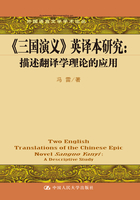
1.4 Problem statement and focus
Both Roberts's and Brewitt-Taylor's translations of Sanguo Yanyi will be used in this study. Judging by the extensive metatexts on Roberts's translation, he seems to have provided more detailed and comprehensive information on the work in addition to the complete translation of the original text. However, the continued popularity of Brewitt-Taylor's translation shows that readers and publishers like it one way or the other, indicating that Roberts's new translation has not completely taken its place. Roberts gave a “word of recognition” to Brewitt-Taylor's 1925 translation in the acknowledgements to his 1994 translation, saying he read it “long before gathering enough Chinese to confront the original”(Roberts 1994). The popularity of Brewitt-Taylor's translation makes it worthwhile to investigate how the approaches and strategies he employed are different from those used by Roberts. The following reviews provide a general comparison of the two translations. A detailed analysis of the two translations will be conducted in Chapter 5.
on Roberts's translation, he seems to have provided more detailed and comprehensive information on the work in addition to the complete translation of the original text. However, the continued popularity of Brewitt-Taylor's translation shows that readers and publishers like it one way or the other, indicating that Roberts's new translation has not completely taken its place. Roberts gave a “word of recognition” to Brewitt-Taylor's 1925 translation in the acknowledgements to his 1994 translation, saying he read it “long before gathering enough Chinese to confront the original”(Roberts 1994). The popularity of Brewitt-Taylor's translation makes it worthwhile to investigate how the approaches and strategies he employed are different from those used by Roberts. The following reviews provide a general comparison of the two translations. A detailed analysis of the two translations will be conducted in Chapter 5.
The translation by Brewitt-Taylor is highly readable and retains the dignity in English of the majesty of the classical Chinese. I am especially impressed by his admirable rendering of the passages of poetry in rhyme and metre. His translation has made this most popular tale of the East a classic now for the West also.
Brewitt-Taylor's translation is nice to listen to. “Empires wax and wane, states cleave asunder and coalesce”; the sound itself is beautiful, and yet still renders the sense clearly. The Roberts translation certainly succeeds in the latter, but the beauty is lost. However, Brewitt-Taylor requires a very great vocabulary, whereas Roberts is more tame in this regard. Still, this was a book for scholars, and the translation should at least reflect that.
This translation (Moss Roberts's Translation) has a modern feel, so it was easier to read than other translations that I have read. Moss Roberts does a good job of making the story flow. However, as some other reviewers have said, it doesn't have a poetic feel. While the story has been translated, it is always difficult to translate literature into other languages. Having said that, I think this is an excellent translation for those who want an easy read or those who are reading Three Kingdoms for the first time.
The researcher aims to conduct an investigation of the two English translations of Sanguo Yanyi from a different perspective than the studies previously referred by choosing different sample segments and adopting different approaches. The main purpose of the study is to draw comparisons between the two TTs by firstly describing the relevant factors that affect the production of each of the translations and secondly by trying to identify and determine the approaches or strategies employed by the two translators. The analysis and findings will be used to ultimately ascertain which translation succeeds in conveying the collective memory of some of the cultural-historical issues in China, while at the same time making the text accessible to Western readers.